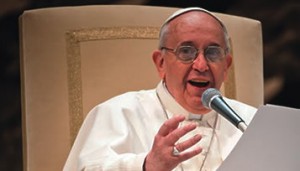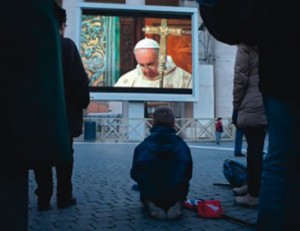St Paul, Evangelizer – Ways out of Ourselves
 St Paul the Evangelizer
St Paul the Evangelizer
Pope Francis on the attitude of the good evangelizer: open to all, ready to listen to all, without exclusions.
The example given by the Pope is that of the Apostle Paul in the Areopagus proclaiming the name of Jesus Christ among the worshippers of idols. According to the Pope, the way in which St Paul spoke to worshippers of idols in the Areopagus (Acts 17:15-22, 18-1) is important: “He does not say: ‘Idolaters! go to hell ... ”, but “tries to get to their hearts”; he does not condemn from the beginning, but seeks dialogue. “Paul is a Pope, a builder of bridges. He does not want to become a builder of walls”. Building bridges for the Gospel, “this is the attitude of Paul in Athens: build a bridge to their hearts, and then take a step further and proclaim Jesus Christ”. Paul followed the attitude of Jesus, who spoke to everyone, “he heard the Samaritan woman... went to lunch with the Pharisees, with sinners, with the publicans, with the doctors of the law. Jesus heard everyone and when he said a word of condemnation, it was at the end, when there was nothing to do”. But Paul is also “aware that he must evangelize, not proselytize”. The Church “does not grow by proselytizing, Benedict XVI has told us, but grows by attraction, through the witness, and through preaching”. Finally, “Paul does so because he was sure, sure of Jesus Christ. He had no doubt of his Lord”.
Paul teaches what the path of evangelization should be, to follow with courage. And “when the Church loses this apostolic courage, it becomes a Church that does not move. Orderly, nice, very nice, but not fertile, because it has lost the courage to go to the outskirts, where there are so many people who are victims of idolatry, worldliness, and weak thought”. In order to curb the fear of making a mistake, you have to think that you can rise and continue to move forward. “Those who do not walk for fear of making a mistake – concluded Pope Francis – make the most serious mistake”.
Homily of 9 May 2013. Source: Osservatore Romano
Two ways out for Christians
Jesus’ wounds are still present on this earth. If we are to recognize them we must come out of ourselves and reach out to our needy brethren, to the sick, the ignorant, the poor and the exploited. Pope Francis continued:
“It means coming out of ourselves”, made possible by prayer, “to the Father in the name of Jesus”. Instead the prayer that “bores us” is “always within us, like a thought that comes and goes, but true prayer is... an exodus from ourselves towards the Father, made “with the intercession of Jesus”.
But how can we recognize Jesus’ wounds? How can we trust in them if we cannot identify them? The Pope was explicit: “Unless we can come out of ourselves towards those wounds, we shall never learn the freedom that brings us to the other way out of ourselves, through the wounds of Jesus”.
Hence the Holy Father’s image of the two “ways out of ourselves”: the first is “towards the wounds of Jesus, the other is towards the wounds of our brothers and sisters. And this is the path that Jesus wants us to take in prayer”. “If you ask anything of the Father he will give it to you in my name” (Jn 23-28): Jesus is disarmingly clear. In these words there is something new, the Pope said: “in my name”.
What does “in my name” mean? It is a new element which Jesus reveals at the Ascension. Jesus, in rising to the Father, left the door open. Not because “he forgot to close it”, but because “he himself is the door”. It is he, our intercessor; so he says: “in my name”. In our prayers let us ask the Father in Jesus’ name: “Look at your Son and do this for me!”
Homily of 12 May 2013. Source: Osservatore Romano
Photo credits: www.catholicherald.co.uk
 Entries(RSS)
Entries(RSS)